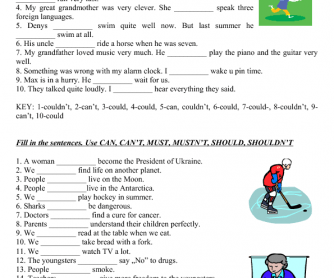
Rohan: You (a) _ do something to reduce your weight. Question 1: Complete the following dialogue with appropriate modals, choosing from the given options. Fill in the blanks with appropriate modals, choosing from the given options. It (e) _ definitely sharpen their intellect and help develop good vocabulary. Children (d) _ be encouraged to read books. Reading (c) _ still be the most absorbing pastime. Gone are the days when children (b) _ still be read Amar Chitra Katha, Nancy Drew, Sherlock Homes, etc. Most parents wish that their children (a) _ spend more of their leisure reading than watching television or playing computer games. Question 2: Fill in the blanks with appropriate modals, choosing from the given option. Question 1: Fill in the blanks with appropriate modals, choosing from the given options.

To express a pure future with first-person ( I, we), for example –.To show absence of necessity or compulsion, for example –.To express assumption or possibility, for example:.To express emphatic advice/ determine, for example – You must consult a doctor at once.To express obligation or duty, for example –.


To express a polite request, for example – Could I take your pen?.To express ability/capacity in the past, for example – He could walk very fast in his youth.To express ability or capacity, for example – I can run very fast.To express permission, for example – You can go home now.They express meanings or ideas such as permission, possibility, certainty, necessity, obligation, command, compulsion, ability, capacity, etc.Ĭan, could, may, might, shall, should, wall, would, must, ought to, need to, have to, used to, dare, etc.Ĭouldn’t, shouldn’t, mustn’t, needn’t, wouldn’t, ought not to, etc. They are always used with the principal verb that follows them. Modals definition for kids: The words that describe the mode or manner of the action denoted by the verb are called modals.


 0 kommentar(er)
0 kommentar(er)
